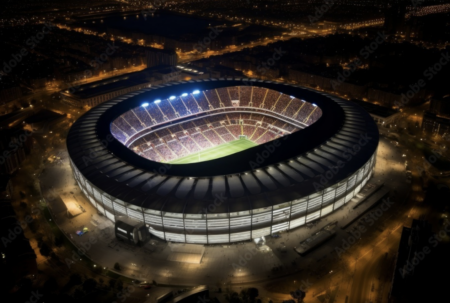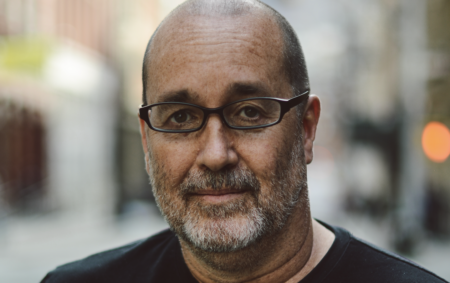You’ve been involved in six consecutive Olympics. Can you tell us a little about your roles?
I’ve worked predominantly on the summer Games, essentially on each Olympics since Sydney – with the exception of Tokyo, I haven’t had much of a role there, but I have had a role in every other summer Olympics, and I did also work with Istanbul on the summer Olympics 2020 pitch for that city.
I started working on the Sydney Olympic masterplan and baseball stadium in Homebush, around about 1993. I worked on the Sydney Olympics for seven years, although I was relatively junior at that time in my career. After that, my work on Athens was a different type of work – it was operational and I worked within the organizing committee and advised on how to run the Olympic Games competition venues. I did the same thing in Beijing, but I also worked on, and was one of the designers of, the Water Cube project, the aquatic project in Beijing. So I lived in the city for four years to deliver the project. In London I was also a design architect working on the handball venue, the Copper Box, working along with a UK practice, Make Architects. That was a joint venture.
Image: Make Architects
Have you seen changes in the way that Olympic venues and precincts are designed?
I have, but it’s a very mixed story. I’ve seen mistakes being repeated often, which is frustrating. But I think the main cause of that is every big city that wins the bid to become an Olympic city relies on a high percentage of people to work on the project who haven’t done so before. By definition, they’re coming at it from a position of not being well informed, so you get a lot of mistakes being made over and over again. I suppose there’s not enough experts brought in to help try and accelerate people on these programs. There should be more of that.
Has the expectation of what an Olympic venue should be and do – during the Games and afterwards – also shifted?
Yes, but again it’s a mixed story. London, I think is a high watermark in terms of what I’d call a pretty responsible approach to delivering an Olympic Games and having a strong sense of legacy, in comparison with other cities. I’ve just returned from Greece, and I went to the Olympic venues. It’s just a tragedy what’s happened to those venues. And my gut feeling is that Rio is repeating the mistakes that were made in Athens, in terms of not enough forward planning, especially in the Barra district. It’s got such strong parallels to what happened in Athens that I can’t help but feel mistakes are being repeated again. London was a high point, but I feel that Rio, unfortunately, has gone backward.
Is the largest mistake to design a single-use venue with no thought to what happens after the Games?
Absolutely. The old white elephant syndrome is the biggest mistake you can make. And of course, having no flexibility within the venue is just tragic. There are too many venues designed as one-offs, that have a single purpose. Because of that, you just don’t find operators that can use them successfully years after the event. The best possible venues – and I realize I’m talking about one of my venues here – are those such as the Copper Box in London, which was done on a very low budget, in fact I believe it was the lowest budget of the permanent buildings in the London Olympic Park. There was an enormous effort to make that the most legacy-driven building possible. And I’m just not seeing that in a number of other venues.
Image: Make Architects
Could these kinds of mistakes be contributing to a growing apathy toward hosting the Olympics?
I think so. I find it a huge frustration. The Olympics, in my opinion, can still be an unbelievably good thing for a city. Because of the amount of money spent on these games, you’d think that, along with these budgets would come fantastic innovation. You’d think that there would be fantastic jumps every four years, in terms of amazing innovation and operational things that could be done to run the Games more successfully and efficiently. But unfortunately, it just seems like we see a stagnation every four years. I think the public, because they hear the same problems every four years, do get tired of it. There’s a real moral problem with the Olympics, which has to be solved quickly.
Why do you think these mistakes keep getting repeated?
I think that it depends on the country. Every country and culture is different, and I don’t want to generalize in any way, but I think that there’s a sophistication and a level of development that can vary in different countries. There can be a very low-tech solution to delivering the Olympics, which is probably how I would categorize Athens and Rio. I think London’s solution was much more legacy driven and much more answerable to the people, which produces a certain result. Beijing was a very single-handed project – the government answered to themselves, but to the city’s credit, Beijing has the population to keep almost all of the venues that they built well looked after. I think beach volleyball and the rowing venues are the only two that have significantly suffered after the Games.
If somebody hired you to advise on a city’s bid, what are the core principles that you would stress to them?
Every single decision must be legacy driven and legacy focused. All of the decisions you are making are about the legacy, and not about the Olympics – you plan for the legacy first and then you work backwards to make it work for the Olympic Games. That is key.
Temporary structures, there’s no doubt, are better than permanent buildings, especially if the city does not need a venue of that size as part of its legacy. There are far too many permanent buildings built within the Olympic world, and I think that there’d be an encouragement for the higher cost of temporary buildings to be swallowed by the host cities – they should focus on the cost benefits they’ll get over the next 30 years. They are definitely expensive projects as one-offs, but of course they can be relocated, and then you don’t incur those costs in the future.
These things aren’t new, and have been said many times before, but I’d be banging the drum very loudly on these points.
The other thing that I would be strongly recommending would be to work in much closer partnership with the current host cities. When you get awarded the Games, there’s already an Olympics that is still being prepared, and which still has three years to go. There’s an enormous amount of waste, and not enough efficiency gained – or even temporary venues relocated between cities. That should be investigated.
Image: John Pauline
This sounds like the often-discussed idea of generic Olympic infrastructure that moves between cities. Do you see that as an option?
Completely. There’s too much pride in host cities, where they try to do everything uniquely, and with their own signature. As long as that pride can be lowered a little – you can still have your amazing signature venues, but just don’t build so many of them.
Are there elements of the Rio infrastructure that have taken heed of some of the factors you mention, albeit not enough?
Yes. There’s no doubt that there was strong talk during the planning for Rio of temporary venues and relocations. The key thing with this is follow-through. If a city hosts the Games, and the enthusiasm and the budget doesn’t follow, then all of those plans fall through. I’m a bit worried, for example, if they don’t relocate the venues, if they don’t have a secondary masterplan for Barra where they regenerate it into something new, something legacy driven, efficient and long term, then the area will fall into neglect. It’s really up to the cities to follow these things through. That’s why I’m a little concerned about Rio.
Image: Hassell
Hassell was responsible for the design of over 40 Olympic venues and related infrastructure for Istanbul’s 2020 Olympic bid
Could we see a model of Olympic infrastructure that moves from city to city within our lifetimes?
Absolutely. There are so many advancements in technology and materials. With each of these four-year jumps there should be a very strong, exponential increase in what is achievable. It’s all about getting the best minds and the best ideas in play to provide these things. And those ideas need to come from around the globe, not just from the host cities themselves. I get frustrated because I just don’t see that innovation in the Games, not to the level that you should see, given the budgets that they’re spending in these cities.




